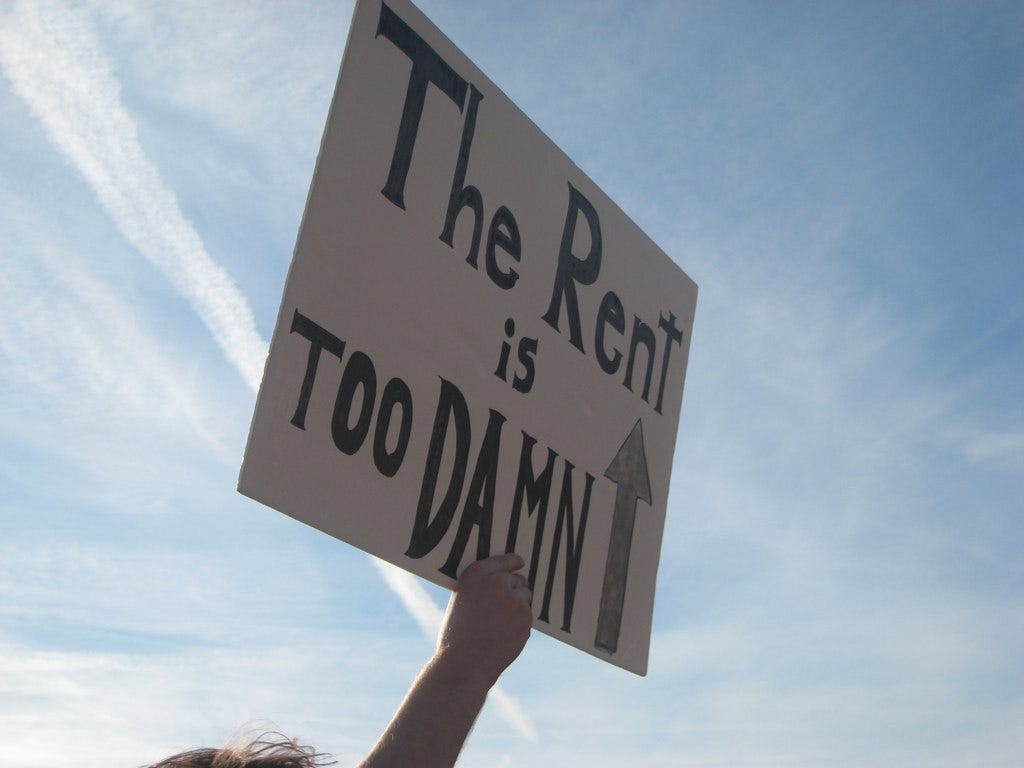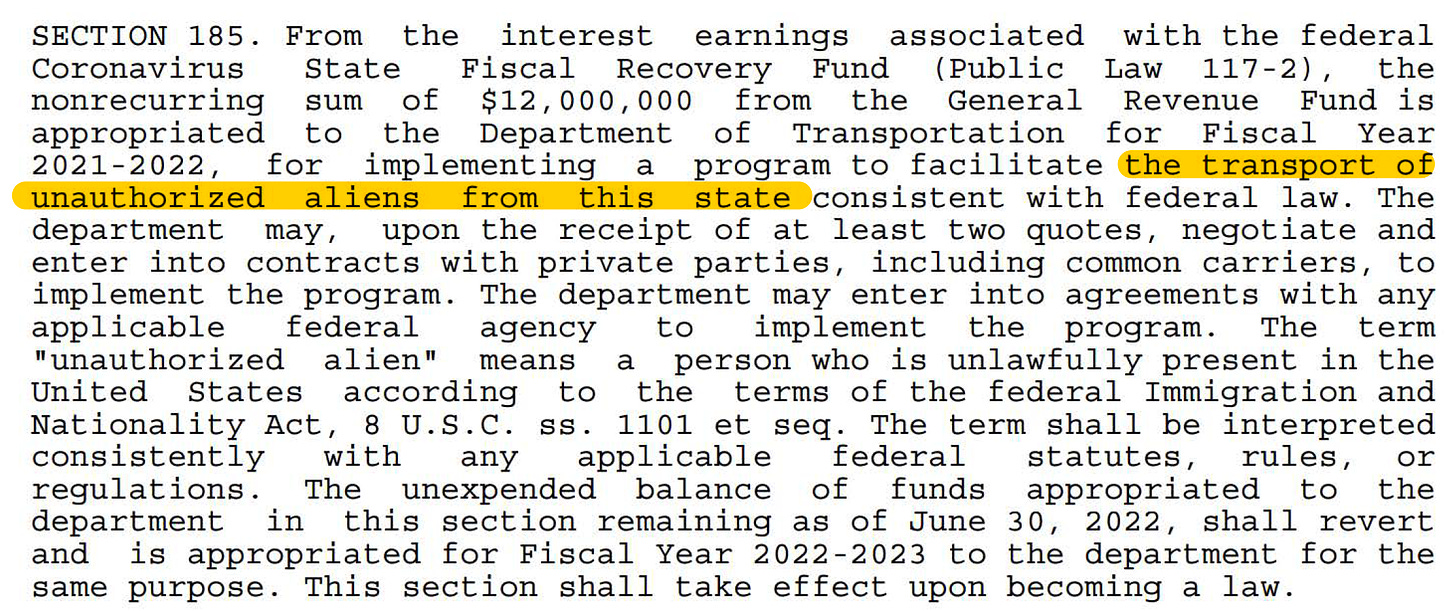Corporate landlords are confident Florida lawmakers will be lapdogs rather than watchdogs
The Trade Show (2023 ed.), Vol. 3

This is “The Trade Show,” a weekly collection of shorter news nuggets and stories from other outlets around the state and country about the special interest-driven issues that lawmakers spend most of their time working on. These are issues that ultimately have enormous impact on everyday Floridians. But they don’t get nearly enough attention outside of Tallahassee, because politicians use culture wars to distract everyone’s attention. The name comes from something a mentor once told me before I covered my very first legislative session more than 20 years ago: “Ninety percent of what goes on up here is a trade show.
The national apartment giant Camden Property Trust owns about 4,000 apartments in Orlando, where the company raised rents by nearly 17 percent last year.
So you might think executives at Houston-based Camden would be at least a little nervous after 59 percent of voters in Orange County approved a referendum calling for rent control.
They are not. Because Camden knows it has Florida’s Republican-controlled Legislature on its side.
“We don’t have a lot of regulatory targets on us,” Ric Campo, Camden’s chairman and CEO, said last week during a conference call to discuss the company’s 2022 earnings. “Even when you look at Florida, for example, where a couple of the markets have tried to put in rent control — I mean, they are just getting massive push backs, both legally and from the state houses.
“So we do need to be vigilant,” Campo added. “But I don’t think we are at risk of having some massive government making us do stuff.”
Campo’s comments came moments after Camden announced its annual profit had soared to more than $650 million and that the company would increase its quarterly dividend payment to shareholders.
All of that was made possible because Camden continued to take more money from its tenants — especially in Florida, where the company owns about 10,000 apartments altogether.
Camden raised rents by an average of 12.4 percent nationally last year — but by 16.5 percent in Orlando, 18.9 percent in south Florida, and 20.4 percent in Tampa.

But it sure looks like Campo is right: Camden has nothing to fear from Florida politicians.
Senate President Kathleen Passidomo (R-Naples) unveiled her affordable housing plan last week — and the very first provision in the bill would dissolve Orange County’s rent-control referendum and prevent any other cities or counties in Florida from ever pursuing rent control in the future. Gov. Ron DeSantis said he’ll probably support the package.
Camden isn’t the only corporate landlord confident that Tallahassee is full of lapdogs rather than watchdogs, either.
“As we look at our states in which we operate, and the municipalities, there is some rent control pressure or proposals that come up from time to time. But [we] really don’t ever see them gain any traction,” Rob DelPriore, the chief administrative officer at Mid-America Apartment Communities Inc., said last week on Mid-America’s 2022 earnings call.
“So from a short- [or] medium-term, we don’t really see anything, as we’re tracking legislation across the board, that gives us any significant concern,” he added.
Germantown, Tenn.-based Mid-America, which owns more than 15,000 apartments in Florida, turned a profit of more than $630 million last year and raised its dividend, too.
That was powered by rent hikes that averaged 14.6 percent nationally — but 17.5 percent in Jacksonville, 18.3 percent in Orlando and 19.6 percent in Tampa.
The governor’s janitors
Speaking of lapdogs vs. watchdogs, the Florida Legislature will convene a special session next week that everyone will claim is about punishing Disney. But it's really about cleaning up the mess DeSantis made when he had his staff con a bunch of migrants in Texas into boarding a plane to Martha's Vineyard.
I'm sure everyone remembers DeSantis' migrant relocation/kidnapping stunt. But a quick recap: DeSantis paid a contractor to round up about 50 mostly Venezuelan migrants in San Antonio, fly them to Martha's Vineyard and drop them off without any warning, and filmed it all for Fox.
DeSantis did this under a provision tucked into the 2022-23 state budget that allowed him to spend up to $12 million transporting "unauthorized aliens from this state."

But DeSantis screwed this up. His staff couldn't find enough migrants in Florida to fill a plane. So DeSantis had them grab some from Texas instead.
Here's the thing: Texas is not in Florida.
These migrants were not transported "from this state."
Then there's the fact that these people were legally seeking asylum in the United States. So they were not necessarily "unauthorized aliens," either. (Though this point is more legally debatable because of the specific federal law cited in the Florida budget language.)
But that's just part of DeSantis' mess here. Because records show one of his top aides secretly helped a former client get the contract to run this program — even using a pseudonym email account named after a character from "The Silence of the Lambs."
The DeSantis administration ultimately paid more than $3 million to that politically connected contractor. But DeSantis still hasn't explained what the vast majority of that money paid for.
The Florida Legislature has been facing pressure to get some answers to this stuff — to act like the co-equal, separate branch of government it's supposed to be. But Republican leaders have refused to do so.
Instead, they're about to rush into a special session to pass House Bill 5B and Senate Bill 6B. So let's have a look at what's in this legislation.
First, it would repeal the current law (and its use of troublesome terms like "from this state" and "unauthorized aliens"). But it would also give blanket approval to whatever DeSantis already spent under the old law, and however he spent it.

So Clarice Starling gets a pass.
But that’s not all. This legislation would then write a new law that clearly allows DeSantis to go get some more asylum seekers — and to get them from anywhere in the country.
And that's how a state legislature turns itself into a governor's janitor.
Tallahassee solves some problems
In addition to covering for the governor and dunking on Disney during a lightning-quick special session, the Florida Legislature will also use next to start really working on legislation for this year’s regular session, which begins in early March.
And one of the very first bills they’re moving on this year is a bill that will hammer one last nail into the coffin of Florida’s long-dead estate tax — which was once one of the state’s few progressive sources of revenue.
You may have heard it called the “death tax,” because the country’s multimillionaires and billionaires have spent a lot of money over the years trying to turn Americans against the estate tax. It’s a tax that the very wealthy are supposed to pay when they pass their fortunes on to their heirs. It stems from a time when most American agreed that the concentration of extreme wealth and power in a few dynastic families posed something of a problem for democracy.
Today, the estates of fewer than one in every 1,000 Americans pay any federal estate tax, which is only levied on fortunes of more than $12.9 million. And many superrich families avoid it entirely, because they’ve persuaded states like Florida to let them sequester their wealth in “dynasty trusts” that can endure for a thousand years or more.

To be fair, the legislation that will be heard in Tuesday’s meeting of the Senate Judiciary Committee (SB 278) seems to be relatively benign.
It would, essentially, suspend enforcement of Florida’s state-level estate tax. That may sound alarming. But Florida’s estate tax has been effectively dead for nearly 20 years, ever since former President George W. Bush and Congress changed federal estate tax laws in a way that rendered the Florida tax ineffective.
And Florida’s Republican-controlled Legislature hasn’t expressed any interest since then in trying to resurrect the state estate tax.
But while the tax itself is long gone, the law that created it is still on the books — which means there are still some paperwork requirements that estates must comply with.
That’s a problem — at least for the few extremely wealthy estates that still have to pay federal estate tax. Those estates can get held up in court while trying to legally prove that they do not owe a Florida tax that Florida doesn’t actually levy anymore.
So SB 278 will get rid of those hurdles and allow estates to be passed on more smoothly. Like I said, not really a big deal, and maybe even a good, if minor, change.
Although, it’s also another example of whose problems tend to get solved in the state Capitol.
Billionaire heir with an inheritance tied up in court? We’ll get right on that.
Housekeeper in Orlando struggling to pay the rent? Good luck to you.
If you read nothing else…
If you click on only one link this week, make it this one: A fantastic explainer from Vox about how some states, including Florida, have slashed taxes on the wealthy and shifted more of the burden of paying for state and local services onto lower- and middle-income taxpayers. It’s also led to chronic under-investment in safety nets and other critical public services.
Read: The ultrarich are getting cozy in America’s tax havens at everyone else’s expense (Vox)
Owning the libs by propping up Big Oil
A bunch of politicians in Florida — particularly Gov. Ron DeSantis and House Speaker Paul Renner (R-Palm Coast) — have spent a lot of time lately attacking environmental, social and governance investing policies. Renner even went on an ESG tirade in his acceptance speech when he was sworn in as House speaker.
Whether they know it or not, the politicians attacking ESG are doing the bidding of the fossil fuel industry and lobbying groups like the American Petroleum Institute. That’s according to the liberal zealots at…
*checks notes*
…S&P Global.
Read: Strong, state-based network' fuels opposition to ESG investment (S&P Global)
‘Maybe you try to control the process’
We’re going to see a lot of public-sector union-busting in Tallahassee this session, as Gov. Ron DeSantis pushes a bunch of changes meant to make it harder for teacher unions to collect dues and easier for university administrators — and the gubernatorial appointees who oversee them — to fire tenured professors.
Meanwhile, The Lever recently published an inside look at how the private sector is trying to bust up unions before they begin, after listening in on the “Restaurant Legal Summit” — an annual conference organized by the legal arm of the National Restaurant Association (aka “the other NRA”).
Read: Fear And Loathing Among The Union Busters (The Lever)
The Chamber has entered the chat
It’s now been more than two years since what may have been the most corrupted legislative elections in modern Florida history. But investigators in Miami, Orlando and Tallahassee are still piecing together the details of how it all unfolded. And they recently unearthed a whole bunch of money connected to the Florida Chamber of Commerce.
Read: ‘Ghost’ candidate probe unearths big business transfers to dark money groups (Orlando Sentinel)
The governor’s privilege
Ron DeSantis has tested a lot of legal boundaries during his time as governor, from suspending a state attorney over his speech to , most recently, trying to revoke the liquor license of a small theater that hosted a drag show.
But this is one that ought to alarm anyone who cares about government transparency: The governor has been arguing in multiple court cases that he has executive privilege — akin to a U.S. president — that allows him to defy Florida’s public-records laws.
DeSantis’ lawyers have found at least one judge who agrees with them, too, which sets up a potentially precedent-setting appellate court showdown that could turn this theory of gubernatorial executive privilege into binding law.
Read: DeSantis has executive privilege, a judge ruled, setting up legal battle over secrecy (Tampa Bay Times)






god bless you for wading through this sewage with your lantern - all the power to you, i will fight as well